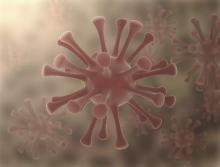SAN FRANCISCO – In patients infected with hepatitis C virus (HCV) who have decompensated liver disease, a 12-week combination drug regimen with velpatasvir and sofosbuvir (VEL/SOF) with or without ribavirin (VEL/SOF/R) achieved an overall sustained virologic response (SVR) rate of 94%, according to a late-breaker trial presented at the annual meeting of the American Association for the Study of Liver Diseases.
The phase III trial, called ASTRAL-4, randomized patients with HCV genotypes 1, 2, 3, 4, and 6 to one of three regimens. The simplest regimen, which required a single daily pill, achieved 100% SVR rates in genotypes 2 and 4, according to Dr. Michael R. Charlton of Intermountain Medical Center, Salt Lake City, Utah.
In this trial, 267 patients with HCV and decompensated liver disease were randomized to 12 weeks of 400 mg sofosbuvir and 100 mg velpatasvir in a fixed-dose single-pill combination, 12 weeks of SOF/VEL plus weight-based ribavirin (VEL/SOF/R), or 24 weeks of VEL/SOF. The majority (55%) were treatment experienced. Patients with hepatocellular carcinoma or prior liver transplant were excluded. Most (78%) had genotype 1 HCV. Only one patient had genotype 6.
On VEL/SOF alone for 12 weeks, the SVR rates ranged from 100% in patients with genotypes 2 or 4 HCV to 88% in genotype 1 and 50% in genotype 3. With the addition of ribavirin, the 12-week SVR rates climbed to 96% in the genotype1 group and 85% in genotype 3 group. After 24 weeks of VEL/SOF, the single genotype 6 patient in this trial achieved SVR.
SVR rates in those receiving VEL/SOF for 24 weeks were not much better than those achieved by the 12-week regimen. While SVR on the extended regimen was 100% in those with genotype 4 (as it was after 12 weeks), it remained 50% in genotype 3, which was achieved after 12 weeks. The SVR rate after 24 weeks VEL/SOF was 75% in genotype 2 patients and 92% in genotype 1 patients.
All regimens were well tolerated. Although 18% of patients experienced serious adverse events, all but one was considered to be unrelated to therapy. Most adverse events overall were consistent with the underlying liver disease or with the known side effects of ribavirin.
“Among patients who achieved SVR, 47% had improvements in Child-Pugh score and 57% had improvements in MELD scores 12 weeks after treatment, largely driven by increases in albumin and decreases in bilirubin,” Dr. Charlton said.
Emphasizing that the current treatment options for HCV with decompensated liver disease are “limited,” Dr. Charlton indicated that the SVR rates achieved with velpatasvir, a pangenotypic HCV NS5A inhibitor, in a fixed-dose pill with sofosbuvir are encouraging. Although the addition of ribavirin may be required for optimal SVR in some genotypes, several HCV subgroups appear to be adequately treated with a single once-daily pill taken over 12 weeks.
Gilead Sciences petitioned the Food and Drug Administration in October for approval of a fixed-dose combination of sofosbuvir/velpatasvir, according to a statement from the company.
Dr. Charlton reported financial relationships with Abbvie, Gilead, Janssen, Merck, and Novartis.


